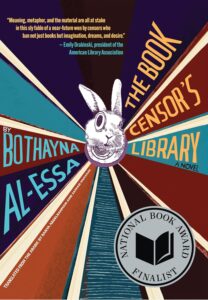(Reviewed by JD Jung)

This cautionary tale takes place “sometime in the future, in a place that would be pointless to name, since it resembles every other place.” All I know is that it is at a time when global democracy is obsolete and is considered part of the “Old World”, and individuality and creativity are considered threats to the carefully curated narrative of the government.
Our unnamed narrator is proud to be employed as a book censor as books and reading are considered more dangerous than firearms or drugs. Not only is the reading of history forbidden, due to the attempt of the government to create its own, but also so is creativity and imagination.
Children with imagination are sent to rehabilitation centers for deprogramming. The cause of a vivid imagination is believed to be a biological fault or a result of poor parenting. Our book censor becomes faced with a predicament when his daughter exhibits a vivid imagination, including asking to be sprinkled with fairy dust, and enjoying the company of her imaginary friends.
But that’s not all. He finds himself entranced by a book he is reading to ban, Zorba the Greek. Against every principle of his training, he is also drawn to Alice’s Adventures in Wonderland and Pinocchio. This dilemma sends him down a rabbit-hole, which will make more sense as you read.
Readers will be eager to find out whether our book censor will stay a patriot or become a traitor (like a reader or bookseller). The author weaves the story’s plot and characters into an enthralling tale. It’s both dark and colorful, sad and humorous.
The Book Censor’s Library provides a satirical, yet poignant look at censorship, providing a wake-up call to those who relish their freedom and liberty. How far will governments go to destroy individual creativity and diversity of thought?


